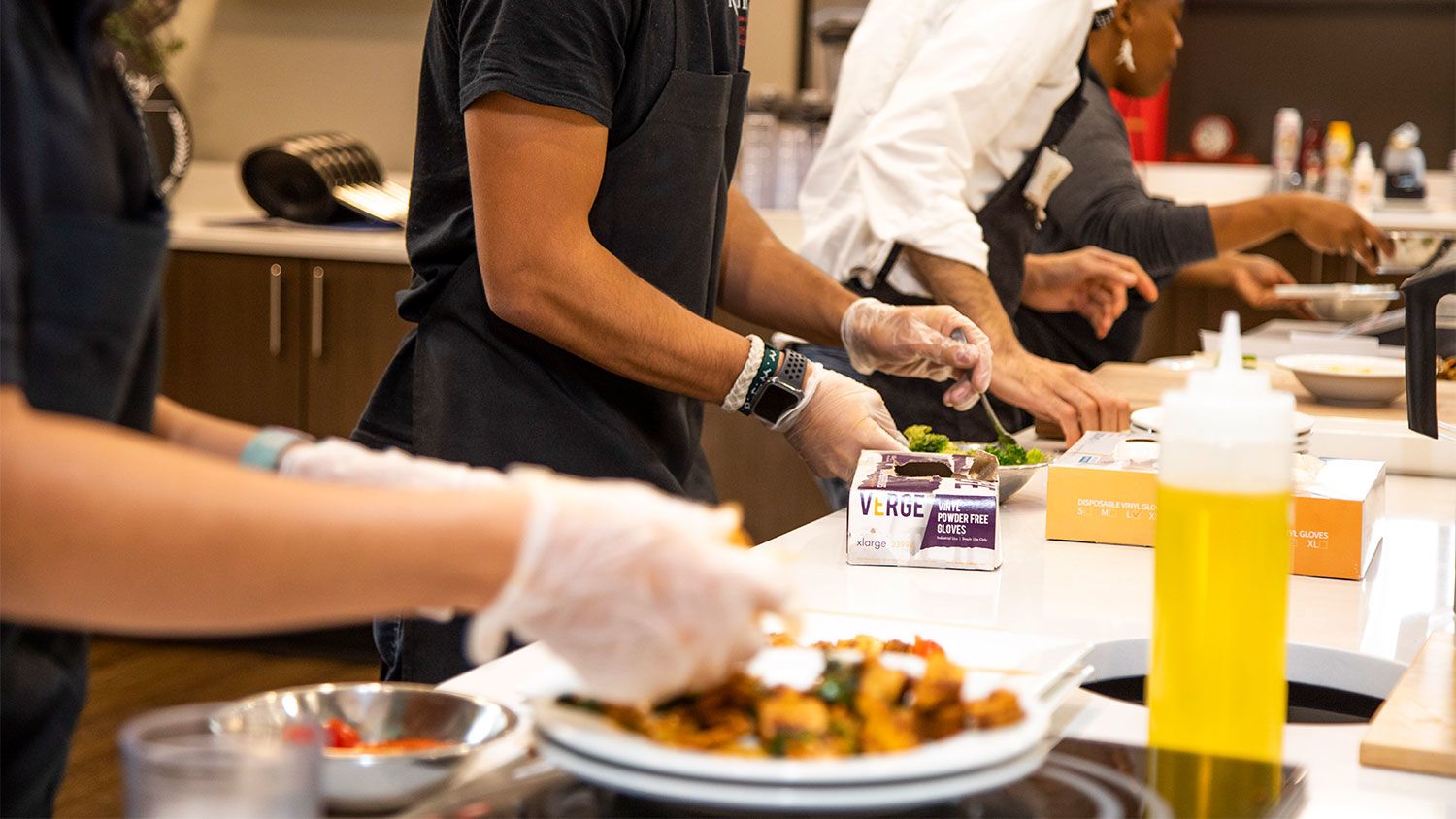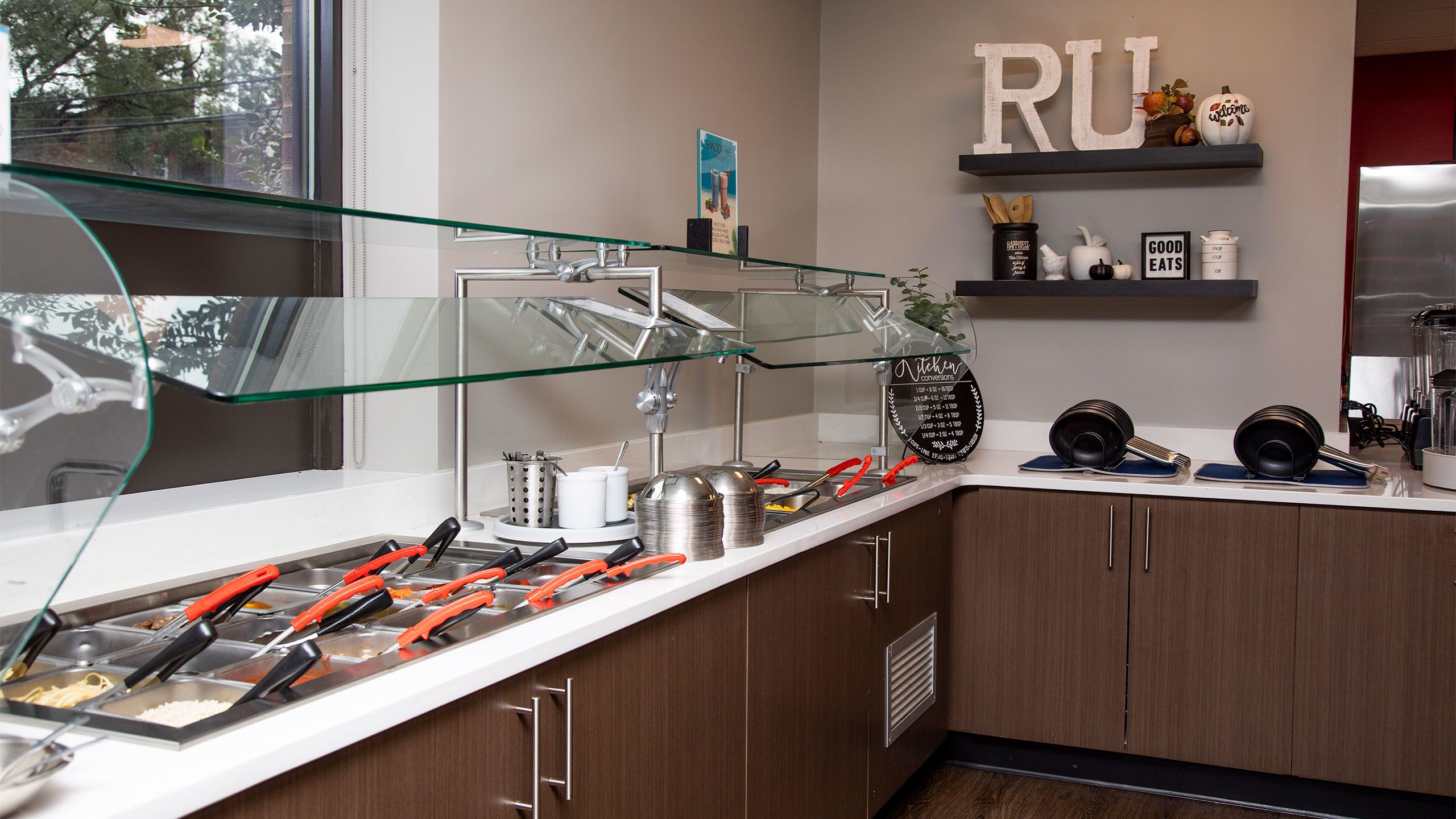A Truly Global Kitchen, In the Middle of Campus

The Teaching Kitchen is one of the many innovative ways that Rutgers University in Camden is personalizing the student experience. Watch the brief video below to see the Teaching Kitchen in action and then read all about how the launch of the Teaching Kitchen is making an impact for our students.
Hailey Gould stirred the pan feverishly, the chicken cubes turning a golden brown. “I’ve never made a meal in 10 minutes in my life,” said the nursing major with a laugh. “But I’ll give it a try.”
“Five minutes!” called out Nick Mazza, Rutgers–Camden’s registered dietician. It was Oct. 4, and the university was celebrating the grand opening of the state-of-the-art Teaching Kitchen, located in the Raptor Dining Hall on the main floor of the Campus Center. The Teaching Kitchen was set to bring healthy options, international flavors, and culinary skills to the student body in an exiciting new way. What better way to mark its arrival than with a friendly cooking competition?
Chef Jehangir Mehta looked on. “Try adding a touch of pesto,” encouraged Mehta, advisor for sustainability, empathy, and performance enhancement for Gourmet Dining at Rutgers–Camden.
Gould sprang into action, and then the thought hit her. “I love anything with garlic in it, on it, or around it,” she said. “Time to add my own special touch.”
As classmates cheered on wildly, Gould and her teammates Nonny Mbathane, a psychology and gender studies major, and Cristian De Los Santos, an accounting and management major, were competing in a cooking challenge to mark the Oct. 4 grand opening of the state-of-the-art Teaching Kitchen, located in the Raptor Dining Hall on the main floor of the Campus Center.
The Teaching Kitchen, which looks more like something out of “Top Chef” than the typical university dining hall, is open daily for students to prepare meals and snacks tailored to their own tastes, dietary restrictions, and faith traditions. Classes on nutrition and culinary skills are held every other week, empowering students to plan meals, cook with set ingredients, and experience new cuisines from around the world.
“Three minutes!”
At a flatiron griddle, Mbathane, a vegetarian, sautéed mushrooms, peppers, and cherry tomatoes infused with garlic and creole spices – all picked from the cornucopia of fresh ingredients in the kitchen’s fully stocked pantry. “I love mushrooms and wanted to use a lot of my favorite spices,” she said.
De Los Santos, meanwhile, was busy whipping up a mango habanero smoothie that would double as the perfect dipping sauce for the chicken and vegetable skewers.
Without a minute to spare, the trio turned in a creative and eclectic winning dish – each student bringing something different to the table – that could only be made possible in Rutgers–Camden’s new, collaborative space.
“How beautiful; it’s like the diversity of our campus represented on a plate,” said Kristin Walker, Rutgers–Camden’s executive director of special initiatives, events and dining.
The novice chefs are among countless Rutgers University–Camden students who are now discovering the joys of cooking and nutrition in the Teaching Kitchen.

Chancellor Antonio D. Tillis, dining services staff, and a student cut the ribbon for the unveiling of the Teaching Kitchen
Chancellor Antonio D. Tillis, dining services staff, and a student cut the ribbon for the unveiling of the Teaching Kitchen

Students Hailey Gould, Christian De Los Santos, and Nonny Mbathane work with Chef Jehangir Metha
Students Hailey Gould, Christian De Los Santos, and Nonny Mbathane work with Chef Jehangir Metha

Student Nonny Mbathane prepares her dish
Student Nonny Mbathane prepares her dish

Student Hailey Gouldw working at her sauté station
Student Hailey Gouldw working at her sauté station

Students begin to plate their dishes
Students begin to plate their dishes

Students plate and display their final dishes
Students plate and display their final dishes

Chef Jehangir Metha takes a selfie with students Nonny Mbathane, Christian De Los Santos, and Hailey Gould
Chef Jehangir Metha takes a selfie with students Nonny Mbathane, Christian De Los Santos, and Hailey Gould
“The Teaching Kitchen is one of the many innovative ways that we are personalizing the student experience,” said Rutgers University–Camden Chancellor Antonio D. Tillis. “Students are learning that mealtime can be healthy, delicious, educational, and made to suit their needs.”

Chancellor Antonio D. Tillis and Chef Jehangir Mehta discuss the innovative Teaching Kitchen
Chancellor Antonio D. Tillis and Chef Jehangir Mehta discuss the innovative Teaching Kitchen
At the sauté station, students can choose from a range of ingredients, including grains, noodles, tofu, proteins, cheeses, and an assortment of vegetables. The cooking station features five flat electric griddles along with a host of condiments and spices. At “Smoothie Paradise,” students can pick from a variety of fruits, vegetables, and yogurts to whip up their favorite concoctions. The waffle station, loaded with toppings like cinnamon, chocolate syrup, and caramel, is the perfect destination for breakfast or dessert.
“We have stocked the pantry with core ingredients but are always open to suggestions for new ingredients that could enhance participation and satisfaction,” said Kathryn DuPlessis, director of dining services for Gourmet Dining at Rutgers–Camden.
The wide assortment of ingredients – staples of culinary traditions spanning the globe – make it evident right away that a great deal of planning and consideration went into representing Rutgers–Camden’s diverse student population. Keeping a listening ear, the dining staff held tabling events and took surveys with students prior to the kitchen’s opening to find out which foods they wanted to see in the kitchen’s pantry.


“Inclusivity is one of our driving focuses,” Mazza said. “We want students to be proud of their cultures and represented, but in their own way. We want them to tell us how their stories should be told.”
Gourmet Dining also regularly updates the culinary and nutrition classes according to seasonality and student feedback, and by regularly introducing new foods, such as a featured superfood of the month.
“We want to ensure that each event has its own feel,” Mazza said. “We are an action dining initiative, not a stand-back-and-watch initiative. It’s all about personalized care and never a one-size-fits-all operation.”
The dining staff is available on an ongoing basis to help suit students create daily meal plans that meet their individual needs and expand healthy, fresh food options. Students also learn how to purchase food for themselves in a healthy and positive way.
“The Teaching Kitchen empowers students to have more options for their own well-being,” said Mary Beth Daisey, associate chancellor for student affairs at Rutgers–Camden. “This is especially important for students with limited ingredient choices in their diet due to food allergens, health needs, or faith traditions.”
Just as importantly, Mazza said, it’s the staff’s privilege and responsibility to show students they can feel “a sense of home.” This includes Rutgers–Camden’s large population of first-generation college students who are growing accustomed to being away from home and unable to draw on shared experiences with family members. With the dining staff offering “a guiding hand,” Mazza said, students can discover a whole new world of culinary possibilities and have a comforting, familiar dish to rely on every day.
“For some people, maybe that’s hummus or other plant-based options,” Mazza said. “Other people might love burgers and fries. Comfort foods mean different things to different people.”

Nick Mazza, director of the Gourmet Dining Nutrition Services program at Rutgers–Camden (Gourmet Dining)
Nick Mazza, director of the Gourmet Dining Nutrition Services program at Rutgers–Camden (Gourmet Dining)
Mbathane said that she loves to cook and looks forward to crafting more vegetarian meals in the culinary classes. Gould, on the other hand, said that she made mental notes on the meal she created for the cooking challenge in the hopes of duplicating it at home. She said that she lives in an off-campus apartment and has limited funds, so she’s excited to expand her culinary skills. “I was pleasantly surprised at my dish,” she said. “I thought, ‘I can do this again!’”

Nonny Mbathane discusses the cooking challenge with Chef Jehangir Metha
Nonny Mbathane discusses the cooking challenge with Chef Jehangir Metha
Students looking for recipes can scan QR codes in the Teaching Kitchen’s virtual cookbook. They can also check out the Teaching Kitchen website for tips on creating do-it-yourself dishes such as pasta, omelets, overnight oats, and stir-fries.
With word spreading like wildfire about the Teaching Kitchen, more and more Rutgers–Camden students are now taking meal prep into their own hands. It’s become a common sight to see students cooking shoulder-to-shoulder, exploring the pantry, or stopping by to make a snack before or after class or practice.
While the Teaching Kitchen doors are now open, the dining staff still encourages student feedback. They can reach out via the Talk to Text chat or the Rutgers–Camden mobile app. Classes are limited to five students and are open on a first-come, first-served basis. To register, email Mazza at RUDietitian@gourmetdiningllc.com.
“Spreading the word is only going to make it a greater and more wholesome space,” Mazza said, “It’s an amazing space, but what makes the Teaching Kitchen truly magnificent are the chefs: our Rutgers–Camden students.”

Creative Design: Douglas Shelton
Photography: Ron Downes Jr.